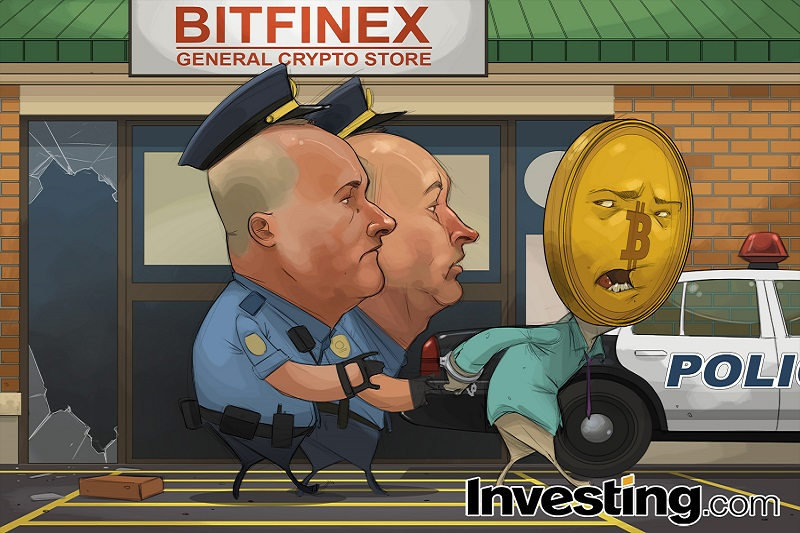By Geoffrey Smith
Investing.com --The arrest of two people in connection with one of the most notorious financial crimes of recent years ought to be a milestone in long march of cryptocurrency into the global economic mainstream.
In reality, things are unlikely to be that clear-cut.
At first glance, the arrests are a vindication of what many crypto fans – especially those trying to build ecosystems of legitimate economic activity on crypto - have long claimed: that the transparency of the blockchain underlying cryptocurrencies makes it, in some respects, an effective – even superior – competitor to money created by central banks; that the digital audit trail blockchain creates is foolproof, and therefore worthy of public trust.
It is, accordingly, a victory for all those who believe that Bitcoin can thrive in the light and emerge from the shady world of criminal transactions for drugs, ransomware and weapons where it has spent its adolescence.
By the same token (no pun intended), it's a blow to those who have embraced Bitcoin for its supposed ability to evade capture by the state and all its organs of financial repression, including the established financial system. The great attraction for a lot of early adopters is lost if there is, ultimately, no hiding your stash from the Feds. But in the bigger picture. that is a minor issue: the long-run potential of crypto depends on some form of mass adoption, the kind of which is impossible without mass trust, buttressed by government regulation that is enforced by the proper state agencies. Extreme libertarians who hoped to found a new, freer and more anarchic financial system will have to cry all the way to – well, to their digital wallets.
That’s the good news. The bad news is that there’s more to gaining public trust than showing that the blockchain works. The business practices and probity of those selling crypto services also have to meet certain standards, notably on such basic functions as custody, and shortcomings here remain substantial.
BlockFi, a company that offers dollar loans against Bitcoin collateral, agreed pay $100 million on Monday to settle Securities and Exchanges Commission charges that it had failed to register such loans as securities. New customers will have to sign up to very different terms and conditions as a result.
But such formalities are less damaging than the revelations that came out in the course of the investigation. It appears, for example, that BlockFi hadn’t collected any collateral against 80% of the loans it had made to institutional customers. If that kind of sloppiness is common practice, then it is hard to see the industry surviving any major correction in cryptocurrencies without an embarrassing and expensive collapse somewhere.
In the meantime, there will at least be the entertaining spectacle of the Department of Justice and Bitfinex fighting over who gets to keep the $3.6 billion equivalent of Bitcoin recovered from the feckless Ilya Lichtenstein and his partner Heather Morgan (who, it should be noted, have only been charged with attempting to launder the money stolen, not with the theft itself).
Bitfinex has confirmed that it wants the DoJ to restore what it sees as its lost property as soon as possible, saying it will use 80% of the proceeds to redeem the LEOu/BTC (‘Leo’) tokens that it issued customers as part of its compensation scheme back in 2016.
Leo tokens on Bitfinex nearly doubled in value on the news of the arrests and are still up some 20% from immediately beforehand.
However, history is against Bitfinex. The DoJ is unlikely to be in a hurry to hand over such sums to an organization whose only information on some customers is their email address, an organization that has already had to pay to settle charges of providing illegal retail transaction services a full two years after the 2016 hack.
According to the Los Angeles Times, DoJ officials plan to set up a court process for victims to reclaim their stolen cryptocurrency. Demands that customers prove the legal origin of their funds are, one would imagine, very likely and, in some cases, more than a little inconvenient.
For those who can jump through the DoJ’s hoops, though, an enormous payday is in store. The Bitcoin stolen in 2016 were worth barely $70 million then. Today they are worth over 50 times as much. But perhaps the more pertinent question is: how much will they be worth when the funds are released months or years into the future, when the judicial process finally runs its course?
